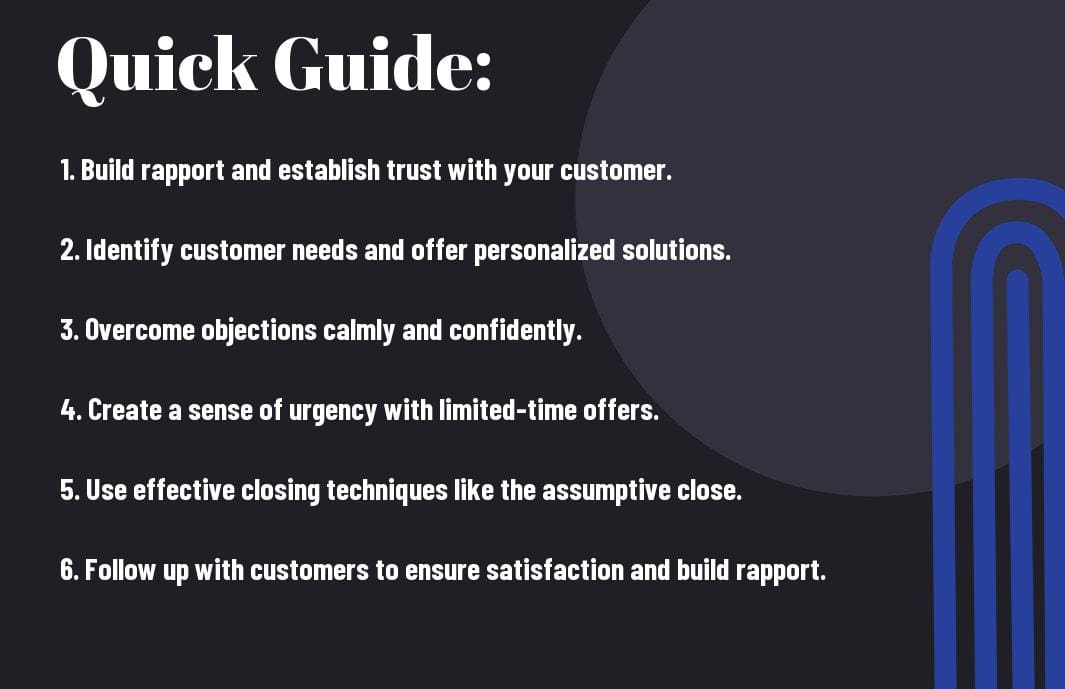Just imagine having the powerful techniques at your disposal to seal the deal and close sales effortlessly. In this comprehensive guide, we will dive deep into the strategies and secrets that top sales professionals use to close deals successfully. From mastering the art of negotiation to understanding psychological triggers that influence buying decisions, we will equip you with the tools needed to ace your sales game. Stay ahead of the competition and elevate your sales performance with these deal-closing secrets.
Key Takeaways:
- Build Relationships: Establishing trust and rapport with your clients is crucial for closing deals. Develop a genuine connection and show that you understand their needs.
- Focus on Value: Highlight the unique value proposition of your product or service. Clearly communicate how it can solve the client’s problems and add significant value to their business.
- Overcome Objections: Anticipate and address objections effectively. Show empathy, listen actively, and provide relevant solutions to alleviate any concerns or doubts the client may have.

Understanding the Types of Closes
Some sales professionals believe that closing a deal is the most crucial part of the sales process. To effectively close a deal, it is vital to understand the different types of closes that can be used in various situations. Knowing when and how to use each type of close can significantly impact your success rate.
| Direct Close | Consultative Close |
| Assumptive Close | Takeaway Close |
Direct Close
Direct closes are straightforward and to the point. This type of close involves directly asking the prospect to make a purchase or commit to the deal. It is particularly effective when dealing with clients who appreciate directness and clarity.
Consultative Close
An effective consultative close involves sales professionals acting as consultants to the prospect, offering personalized solutions and recommendations based on the prospect’s needs. This approach builds trust and helps the prospect see the value in the product or service.
Consultative closes are ideal for complex sales processes where a deeper understanding of the prospect’s requirements is necessary. By asking thoughtful questions and actively listening to the prospect, sales professionals can tailor their pitch to address specific pain points and demonstrate how their offering can solve the prospect’s problems.
Assumptive Close
Any sales professional can use an assumptive close by assuming the prospect is ready to make a decision. This type of close works well when the prospect has shown strong buying signals throughout the sales process. By confidently moving the conversation towards the next steps, sales professionals can subtly guide the prospect towards a purchase.
Understanding the prospect’s mindset and being attuned to their intentions are crucial in executing an effective assumptive close. Sales professionals must be confident in their presentation and have a keen sense of timing to successfully close the deal.
Takeaway Close
Consultative sales professionals often use the takeaway close technique to create a sense of urgency and scarcity. By emphasizing the potential loss or missed opportunity of not making a purchase, sales professionals can motivate the prospect to make a decision.
The key to a successful takeaway close is highlighting the benefits and value of the product or service while also creating a fear of missing out. This technique can push the prospect to take action and move forward with the deal.

Step-by-Step Strategies for Deal Closing
Preparing for the Close
If you want to successfully close a deal, preparation is key. Before entering into a negotiation, make sure you have a thorough understanding of your customer’s needs, objections, and potential pain points. Anticipate potential concerns and have strategic responses ready to address any hesitations that may arise.
Navigating Objections
There’s no deal closing without navigating objections effectively. Understand that objections are a natural part of the sales process and should be viewed as opportunities to provide further value. Listen actively to your prospect’s concerns, acknowledge them, and then offer solutions that alleviate their worries.
For instance, if a customer raises a pricing concern, you can highlight the return on investment they will receive by demonstrating the value your product or service brings to their business.
Creating a Sense of Urgency
Closing a deal often requires creating a sense of urgency. Encourage your prospect to act promptly by highlighting limited-time offers, exclusive deals, or impending price increases. By emphasizing the benefits of acting now, you can motivate the prospect to make a decision sooner rather than later.
Creating a deadline or mentioning scarcity can push the prospect to take action and avoid the risk of losing out on a valuable opportunity.
The Trial Close Technique
Even before the final close, using the trial close technique can help gauge your prospect’s readiness to make a decision. By asking hypothetical questions like “If we were able to address your concerns, would you be ready to move forward?” you can subtly guide the conversation towards a successful close.
Step-by-Step, the trial close technique allows you to test the waters and identify any remaining objections that need to be addressed before sealing the deal.
Tips for Effective Deal Closing
All sales professionals know that closing a deal is the ultimate goal in any sales interaction. It’s the moment when all your hard work pays off, and you secure a new customer or client. Mastering the art of persuasion, utilizing active listening skills, building a strong closing mindset, and timing the close for maximum effect are important components in the deal closing process. The way you navigate these aspects can make or break a sale. Here are some tips to help you effectively close deals and achieve your sales targets:
Mastering the Art of Persuasion
Little did sales professionals know that mastering the art of persuasion is crucial in closing deals. By understanding the needs and motivations of your prospects, you can tailor your pitch to address their specific pain points and desires. Use compelling language, storytelling, and social proof to persuade them to see the value in your offering.
Utilizing Active Listening Skills
Utilizing active listening skills is vital in the deal closing process. By listening attentively to your prospect’s needs and concerns, you can demonstrate empathy and build trust. Ask probing questions to uncover valuable insights and show that you genuinely care about finding the right solution for them.
Building a Strong Closing Mindset
Assuming a confident and positive mindset is key to successfully closing deals. Sales professionals who believe in the value of their product or service exude confidence that is contagious. Another important aspect is to stay focused on the end goal and not get discouraged by rejections. Maintain a positive attitude and keep pushing forward to seal the deal.
Timing the Close for Maximum Effect
Effectively timing the close is important for maximizing your chances of success. Pay attention to listening for buying signals from the prospect, such as asking about pricing, delivery timelines, or specific product features. When you sense they are ready to make a decision, confidently guide them towards the close to capitalize on the opportunity.
Critical Factors Influencing Deal Closures
Unlike other aspects of the sales process, deal closures are influenced by several critical factors that can make or break a deal. Understanding these factors is vital for sales professionals looking to improve their success rates. After all, closing deals is the ultimate goal of any salesperson.
Understanding Buyer Behavior
Assuming you have a thorough understanding of buyer behavior is crucial when it comes to closing deals successfully. Being able to anticipate how a potential buyer will react to your pitch can help you tailor your approach and address their concerns effectively.
The Importance of Rapport and Trust
While many factors influence deal closures, rapport and trust are perhaps the most critical. Building a strong relationship with your potential client can significantly increase your chances of closing a deal. This involves active listening, addressing their needs, and demonstrating expertise in your industry.
Reading Non-Verbal Cues
Importance lies in being able to read non-verbal cues during sales interactions. Non-verbal cues can provide valuable insights into a prospect’s thoughts and feelings, helping you adjust your approach accordingly and increase your chances of closing the deal successfully.
Leveraging Sales Enablement Tools
Now, leveraging sales enablement tools has become vital for sales professionals aiming to streamline their processes and enhance their effectiveness. Sales enablement tools can help you manage leads, track interactions, and personalize your approach, ultimately leading to more successful deal closures.
Pros and Cons of Different Closing Techniques
| Technique | Pros and Cons |
| Direct Closing | Direct closing techniques can be effective in quickly moving the sale forward, but they may come across as pushy and aggressive to some clients. |
| Indirect Closing | Indirect closing techniques can build trust and rapport with the client, but they may prolong the sales process and result in missed opportunities. |
Evaluating Direct vs. Indirect Approaches
To determine whether a direct or indirect approach is more suitable, sales professionals must consider the client’s personality, buying style, and preferences. It’s crucial to adapt the closing technique to establish a connection and ensure a successful deal.
The Short-term vs. Long-term Impact of Different Closes
While some closing techniques may lead to immediate sales results, others focus on nurturing long-term relationships with clients. Sales professionals need to balance short-term gains with long-term benefits to maintain a sustainable business growth trajectory.
With the right approach, sales professionals can create a win-win situation where both the client’s needs are met and the sales targets are achieved. It’s crucial to understand the implications of each closing technique and tailor the strategy accordingly to achieve desired outcomes.
Adapting Techniques to Various Sales Scenarios
Approaches that work in one sales scenario may not be effective in another. Sales professionals should be versatile in their closing techniques and adapt them to suit different clients, industries, and situations. Being able to pivot and tailor the approach can lead to increased success rates and stronger client relationships.
It is crucial for sales professionals to remain ethical and transparent throughout the closing process. Adapting techniques to suit different scenarios should never compromise honesty or integrity.
To wrap up
Upon reflecting on the Ultimate Guide – Deal Closing Secrets For Sales Professionals, it is evident that mastering the art of closing deals is crucial for sales professionals. By utilizing the proven strategies and techniques outlined in this guide, sales professionals can enhance their closing skills and achieve greater success in their careers. Bear in mind, closing a deal is not just about making a sale, but about building relationships, understanding customer needs, and providing value. With dedication, practice, and a strategic approach, sales professionals can become more effective closers and drive their business towards growth and success.
FAQ
Q: What are some deal closing secrets for sales professionals?
A: Sales professionals can utilize several techniques to close deals successfully. Some secrets include understanding the customer’s needs, building rapport and trust, actively listening to their concerns, and being proactive in addressing any objections.
Q: How important is follow-up in closing deals?
A: Follow-up is crucial in closing deals as it shows the customer you are committed to their satisfaction. By following up promptly and providing any additional information or support they may need, you can increase the chances of sealing the deal.
Q: What role does negotiation play in closing deals?
A: Negotiation is a key component of deal closing for sales professionals. It involves finding a mutually beneficial agreement that satisfies both parties. Effective negotiation skills can help sales professionals overcome obstacles and reach a successful deal.




